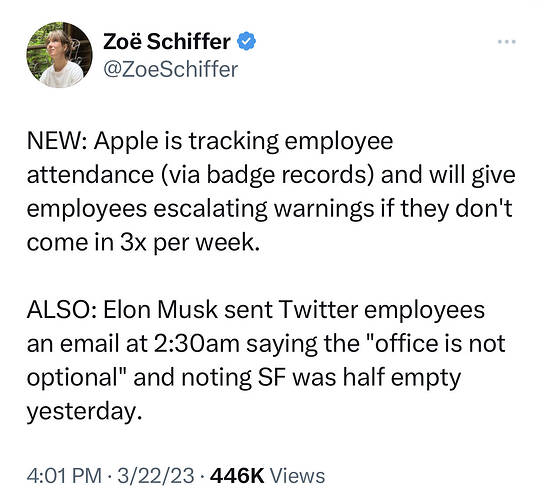Yes. It was a prep session for the interview. It was created because so few were passing the interviews. They needed to help them prepare to be able to pass it. They were having trouble recruiting the thousands of college grads they wanted each year.
What I was saying is hopefully the interview complexity filter matched up with the job complexity.
They were doing it for technical roles hiring CS graduates…
What I was trying to understand is after a company puts a threshold(according to that company’s criteria) for entry, after that filter is applied, Is there a correlation between job performance of the candidate and how good the candidate did in the interview.
Sometimes what the company might get are people who do great in interviews, however in terms of innovative solution creator one might not get those kinds of people. Just a thought, I might be right or wrong.
I don’t think lowering the bar is going to result in higher performance. Just look at what lowering the bar for academic admissions in the name of wokeness has done. Schools have to either lower the standards or have a lower graduation rate.
I don’t see why this would be any different. Facebook originally only recruited at the most prestigious CS programs. They started to recruit from all sorts of programs, so they could increase the numbers. I’m sure some of it was aimed at improving diversity too. We’ve shamed companies into annual reports on diversity. The diversity they want isn’t possible when you look at who’s attending top CS programs. That means they need to find people from lower tier programs or non-traditional backgrounds who can code. Is it really a shock that statistically those people perform worse? People love to point out the outliers for what’s possible, but the statistics of larger sample sizes are undeniable.
It also makes me wonder how much of the middle management bloat was diversity driven. That way they could report x% of managers are from diverse backgrounds.
Yes read somewhere that 60% of Harvard graduates have straight As. That probably applies to many other top schools as well. The person who mentioned this data is a former Harvard University president and was shocked with this number when he first heard it. For admissions he said it’s much better to have a larger pool for admissions rather than reducing the bar for admissions in the name of criteria which has nothing to do with performance or aptitude . The people in China are not dropping advanced algebra in the name of equality of outcomes.
“As a hybrid-first company, we are continuing to assess and optimize our space utilization to create more vibrant workspaces for our employees when they are on-site, while also achieving cost reductions. As such, we will consolidate Intel’s San Jose Innovation Campus with our Santa Clara Mission Campus,” an Intel spokesperson said in a statement to SFGATE.
https://www.sfgate.com/bayarea/article/intel-cutting-office-space-17839684.php
Yup, let’s just lower the bar, so people feel better about the situation.
Another hit piece. Check out the top rated comments. ![]()
Just do a search on google with the search query Opinion | Is Working From Home Really Working? and click on the link from google if directly clicking the link below gets you an article behind a paywall.
I guess there is massive amount of money tied up in commercial RE+residential RE near offices + tax reductions for cities if those offices close. Those people need to get their money out or preserve it ![]()
Wasn’t expecting this from any school in CA but good to read.
A freind of mine from HS was at Stanford while I was at UC.
We (UC) had minimum progress requirements or you were out. That was, one had to successfully complete so many units per quarter or they kicked you out.
Stanford had no such requirements. Even for a scholarship admission like him.
That just amazed me.
In a leaked message, Amazon’s HR chief flatly rejected an internal petition against the new return-to-office policy signed by roughly 30000 employees.
India should be a lot higher than 40% savings (especially for non-engineer roles).
The AI king doesn’t like remote work.
OpenAI CEO Sam Altman says the remote work ‘experiment’ was a mistake—and ‘it’s over’
The idea of fully remote work becoming the norm has come and gone, he said this week at a fireside chat in San Francisco organized by the fintech company Stripe.
“I think definitely one of the tech industry’s worst mistakes in a long time was that everybody could go full remote forever, and startups didn’t need to be together in person and, you know, there was going to be no loss of creativity,” he told attendees. “I would say that the experiment on that is over, and the technology is not yet good enough that people can be full remote forever, particularly on startups.”


